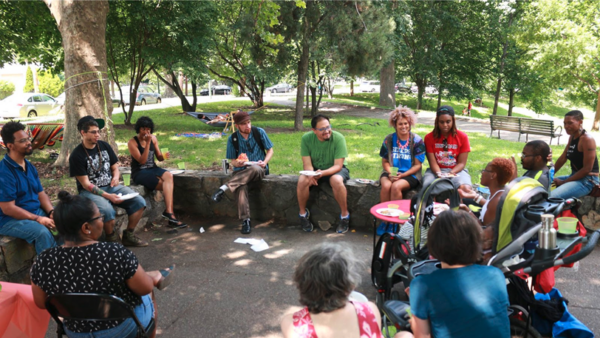 The phrase “nothing about us without us” has been used for centuries by advocates across the world to emphasize that policies and programs about certain people and groups should include them fully in the decision-making process. The mantra likely originated in Central Europe as the Latin form Nihil de nobis, sine nobis to establish foreign policy and legislation and was made popular in the United States in the 1990s by James Charlton, who adopted the phrase from South African disability activists. Since then, it has been used by countless community organizations and movements to fight for the rights of marginalized individuals and groups.
The phrase “nothing about us without us” has been used for centuries by advocates across the world to emphasize that policies and programs about certain people and groups should include them fully in the decision-making process. The mantra likely originated in Central Europe as the Latin form Nihil de nobis, sine nobis to establish foreign policy and legislation and was made popular in the United States in the 1990s by James Charlton, who adopted the phrase from South African disability activists. Since then, it has been used by countless community organizations and movements to fight for the rights of marginalized individuals and groups.
And it’s at the very core of the Penn State Center Philadelphia’s mission and programs. Everything we do is rooted in community engagement and democratic participation — connecting with Philadelphia communities and leaders to support them in envisioning and implementing processes for change. Through our work and resources, we build long-term partnerships using participatory practices to co-create research-driven initiatives focused on social justice that improve lives and strengthen communities in Philadelphia and beyond.
Since 2016, the Center has championed the use of community engagement methods with locally based social movements using Participatory Action Research (PAR) as a best practice for exploring the structures that shape our world. Situated within a university context, the Center uses PAR to build partnerships between Penn State researchers and Philadelphia community members to create more equitable and sustainable outcomes together.
PAR values the knowledge and expertise of our community members and seek to involve them as co-researchers throughout the entire research process.
PAR is collaborative
PAR is a collaborative approach to research that involves community members, organizers, practitioners, young people, advocates, students, scholars, and academics in the process. This collaborative approach leads to more meaningful and effective solutions because everyone involved has a unique contribution and stake in the outcome.
PAR promotes equity and social justice
This approach amplifies marginalized voices and supports them to take action on issues that affect their lives. By involving community members as expert collaborators, it strives to overcome oppressive power dynamics by centering those who have historically been excluded from decision-making processes as leaders.
PAR creates more relevant research
PAR ensures that research questions are framed in a way that is meaningful to the community and that data collection methods are culturally relevant and sustaining. It ultimately strives to produce knowledge and outcomes that are meaningful and relevant to directly impacted communities.
PAR creates more sustainable solutions
This practice involves community members in the entire research process, from planning and design to implementation and action. The community is then invested in the process and has ownership over the outcomes to continue programming and improvements.
PAR builds capacity and skills
PAR is a co-learning process where community co-researchers learn and use new skills — such as data collection methods, analysis, project planning, and social action.
Our team at the Center is planning big things this year and we’re looking forward to growing our programs and initiatives using PAR and establishing this practice as a standard for all equity-based university-community engagement.
